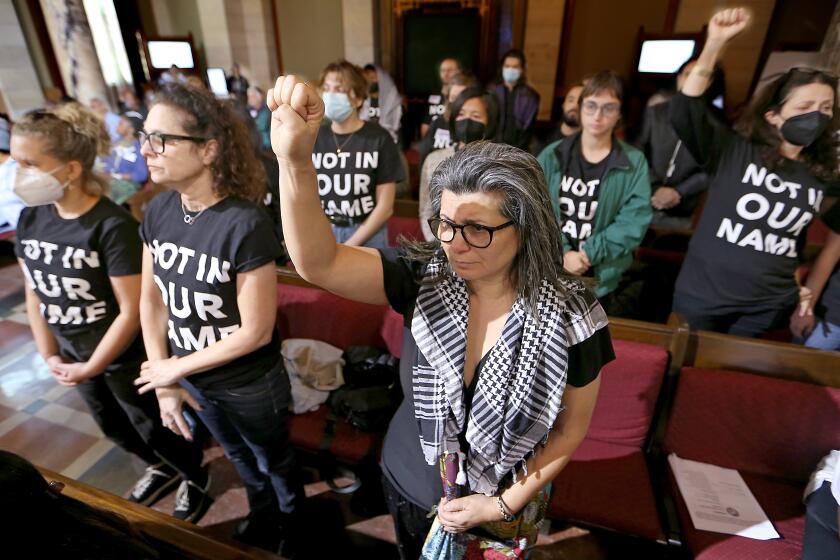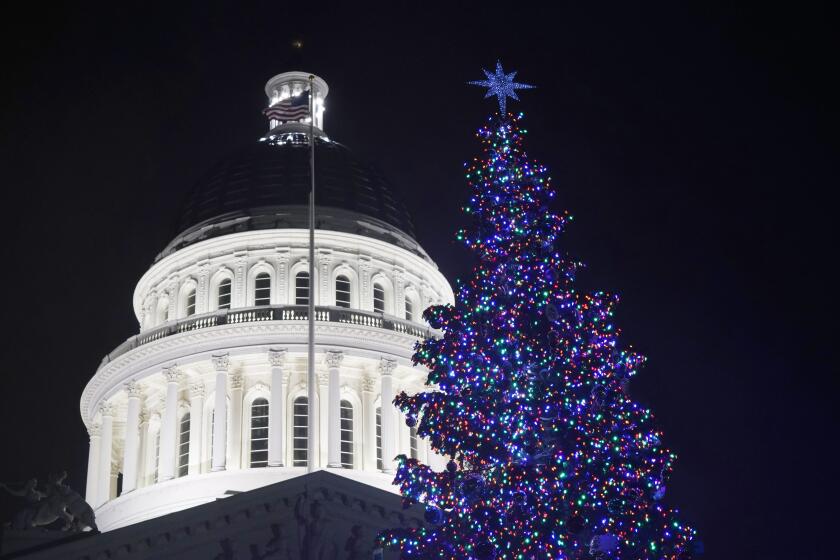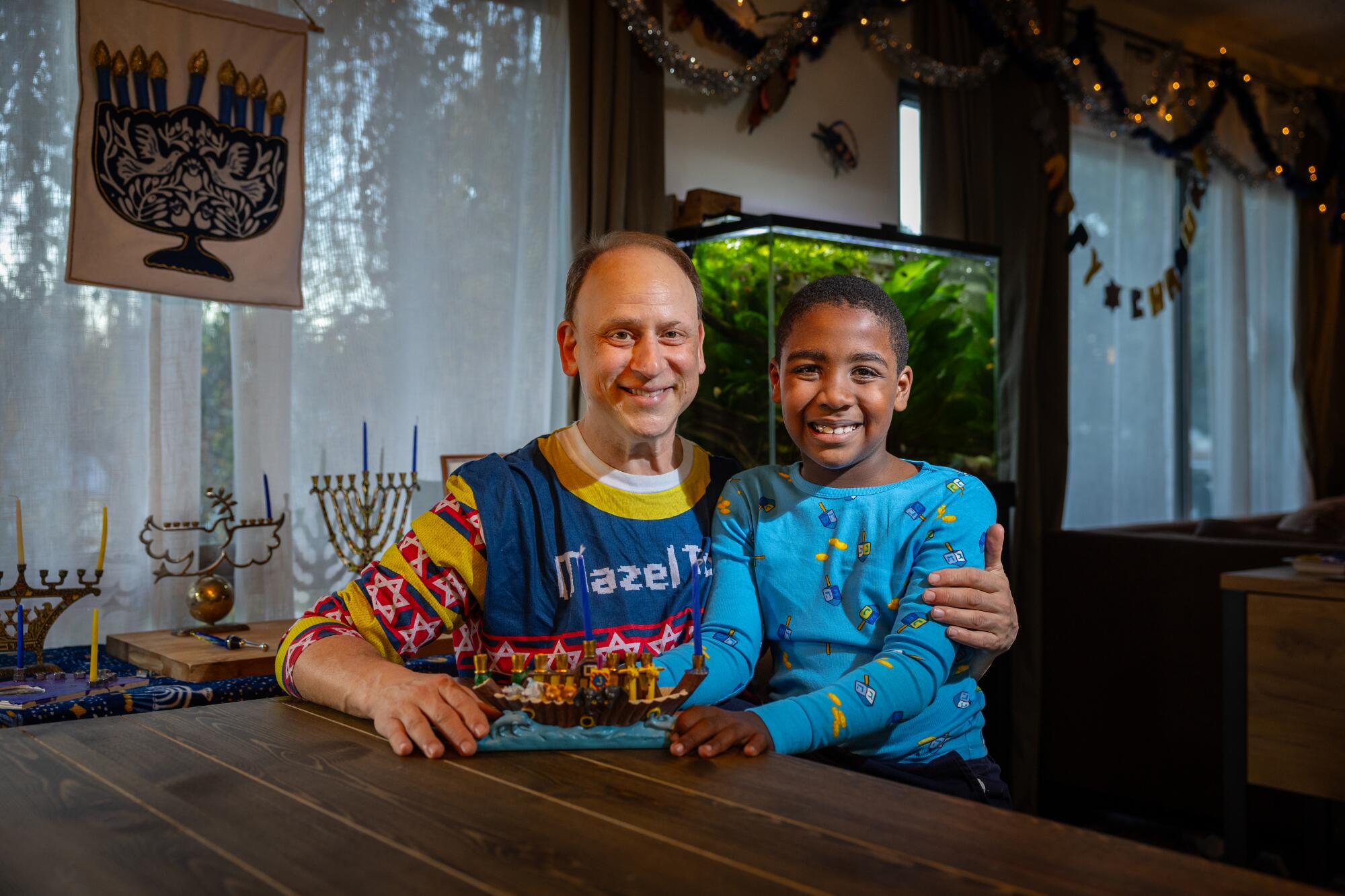
- Share via
There were second thoughts this year when 6-year-old Jack asked his father when the Hanukkah decorations would go up at their Studio City home.
Adam Kulbersh didn’t know how to explain to his son the doleful tinge that paints this moment for Jews amid the Israel-Hamas war and growing fears of antisemitism. A menorah in their window felt like another avenue to invite unwanted attention. It just didn’t feel safe.
“Right now, there are mean people who want to do mean things,” Kulbersh told his son. “My number one job is to keep you safe, and we’re not going to hang decorations.”
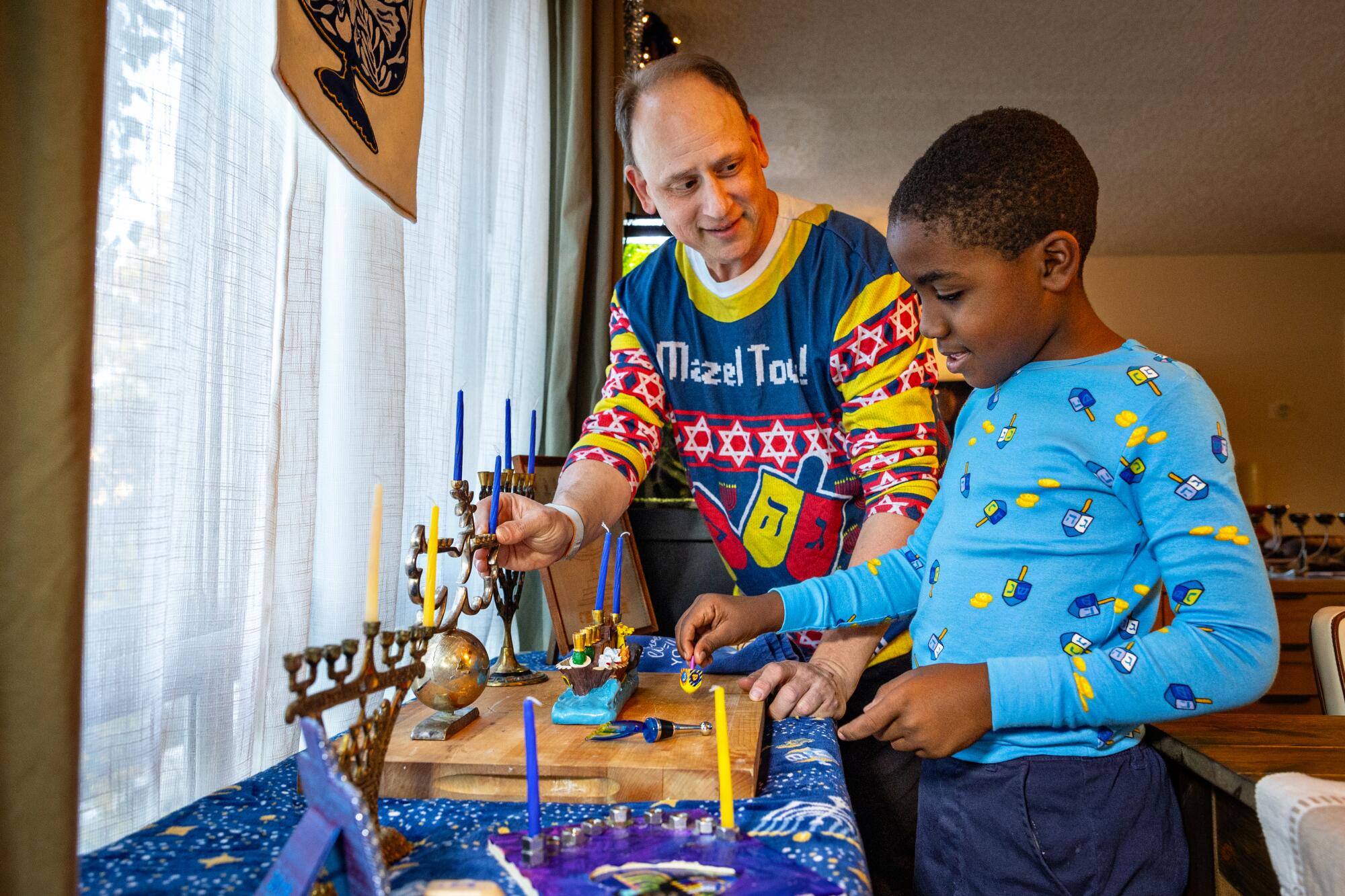
Across the Los Angeles area, home to the second-largest Jewish community in the United States, Jews are struggling over how they want to celebrate Hanukkah as the bloodshed continues in the Middle East.
They grieved the scale of death, and some worried that people would make assumptions about their support for Israel, whose military offensive has killed over 15,000 Palestinians in the two months since Hamas militants killed over 1,200 people and took more than 240 hostage in their Oct. 7 assault.
Many who spoke to The Times did not want to go on the record or provide their full names, fearful of being targeted for their faith.
A store in the Hollywood Hills broke a 30-year tradition when the owner decided not to display a large menorah this year. The owner asked to not have his store identified or his name published for fear that he would be harassed.
“There are crazy people out there in the world. They could come burn it all down,” he said, motioning to his business.
Debate rages as California city councils take a stand on the Israel-Hamas war. As some champion the resolutions, others say they fan the flames of hate.
There’s a feeling that Oct. 7 is now part of a new vector in the American Jewish life, and worry that not enough people condemned the attack by Hamas.
Outside Lieder’s Deli on West Pico Boulevard, Nicole from Atwater Village said the attack is like a bruise that lingers over the Jewish community. She was raised Jewish in Boston and makes the trip to the Pico-Robertson neighborhood at least twice a week because it feels like home.
“I’m feeling a little homesick for the holiday, but I don’t necessarily feel unsafe here,” said Nicole, who only provided her first name and said she worried about what people will think of her when she says she’s Jewish. “I won’t shy away from talking about my faith. That’s why I can shop at a kosher deli guilt free.”
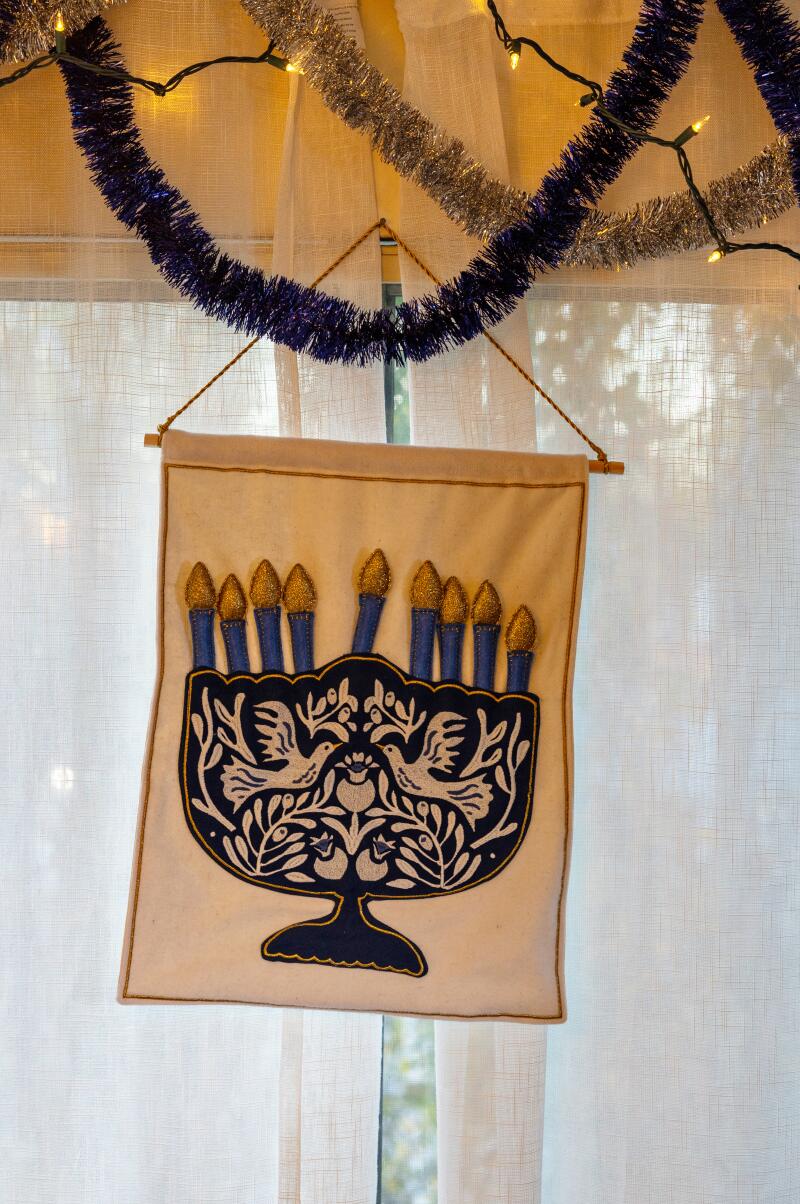
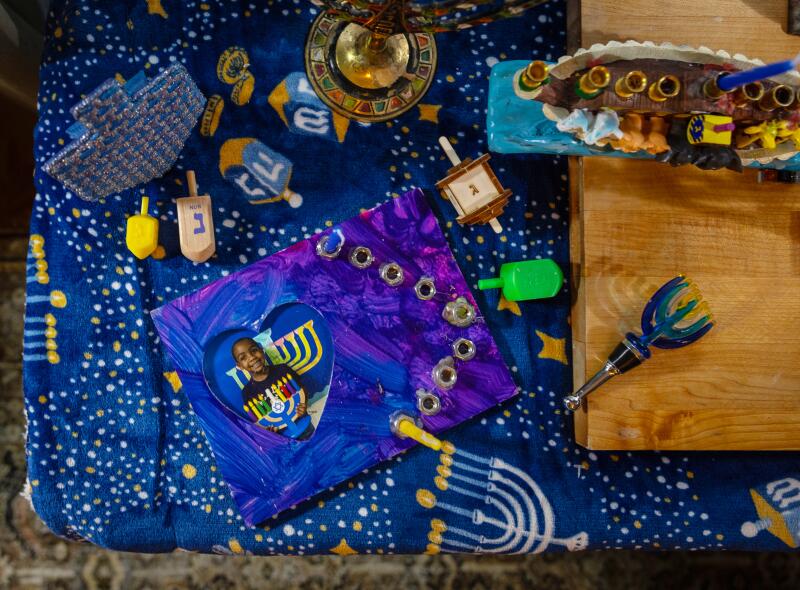
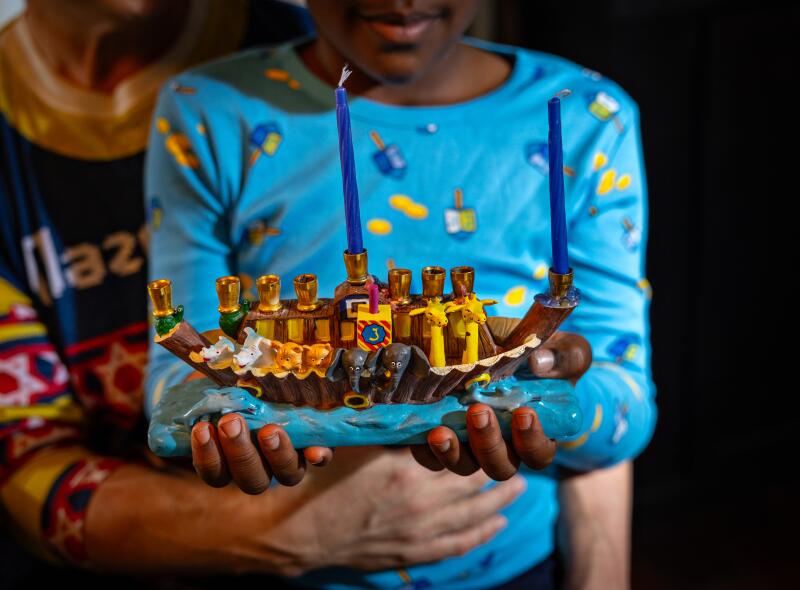
Adam Kulbersh is the founder of Project Menorah prepares for Chanukah. Jack Kulbersh holds his favorite Menorah. (Jason Armond/Los Angeles Times)
Daniela Gerson, a board member of the Jewish spiritual community Nefesh, notes this is the first holiday since the attack. There’s a tremendous amount of grief, she said.
“People take solace in Jewish communion,” she said. “Typically, menorah lighting in my home is private. I don’t plan to change anything about this Hanukkah.”
The eight days and nights of Hanukkah commemorates the preservation of light in the holy temple in Jerusalem during the 2nd century BCE, when the fundamentalist Maccabees revolted against the Greek Seleucid Empire and re-dedicated the temple through the burning of sacred oil, which miraculously lasted eight nights.
The holiday is the festival of lights, but it’s also one centered around a military victory, said David Myers, UCLA history professor and director of the Initiative to Study Hate.
Settler violence against Palestinians in the occupied West Bank surged even before the Gaza war. The travel ban will also apply to some Palestinians.
“There is a way in which this Hanukkah has particular meaning for Jews, especially in light of that interpretation that’s focused on a military triumph,” Myers said in reference to the Israel-Hamas war.
The Maccabees’ victory teaches Jews to “double down on our Jewish identity,” said Rabbi Nolan Lebovitz of Valley Beth Shalom, a conservative synagogue in Encino. Though some congregants have expressed fear in displaying their Judaism in public, Lebovitz said attendance has increased since Oct. 7 and the temple does not intend to shy away from celebrating Hanukkah.
“If Jews cannot publicly be Jews in Los Angeles, then we should not live in Los Angeles anymore,” Lebovitz said.
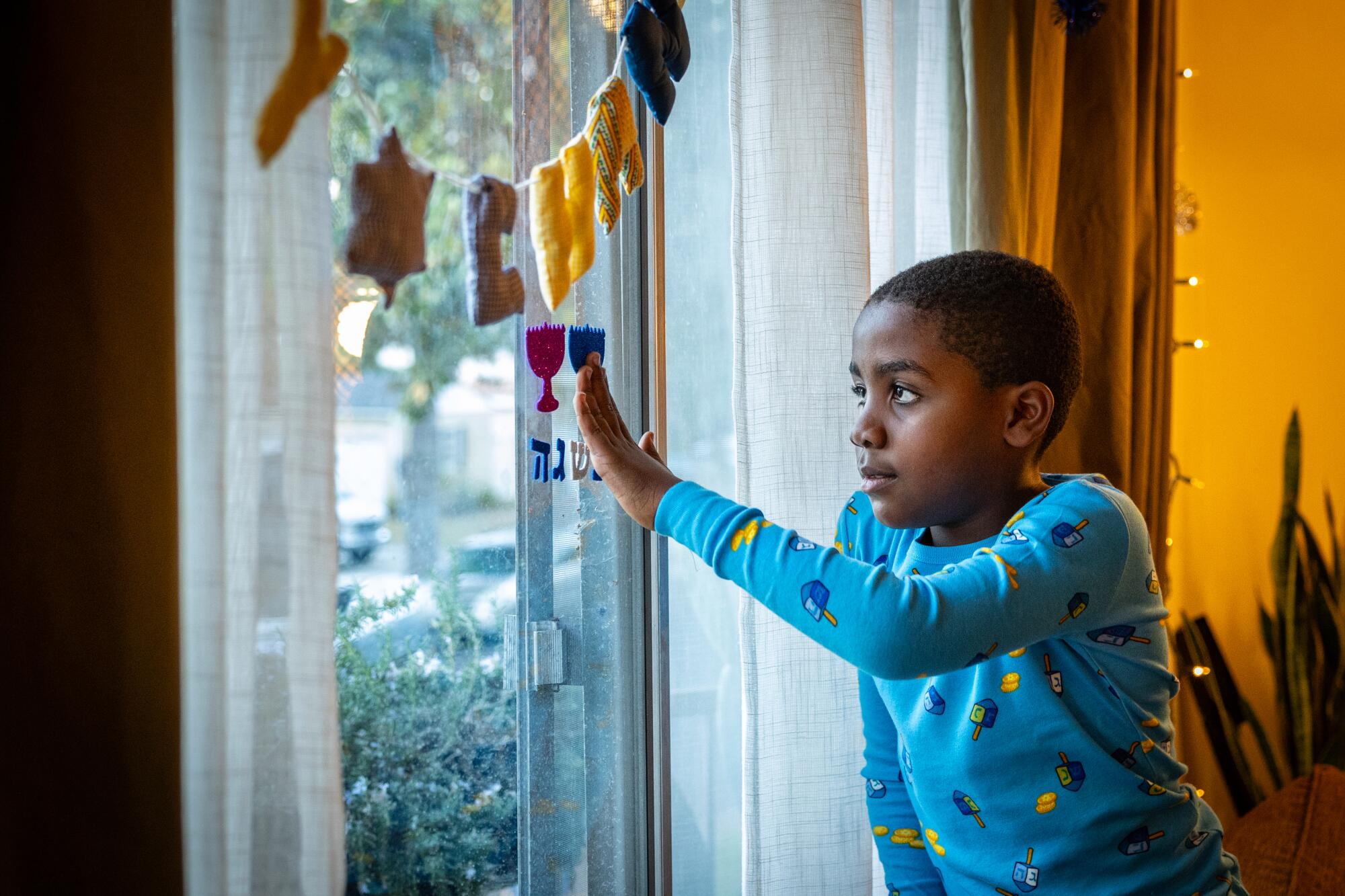
Comparisons between the attack on Israel and the Sept. 11, 2001, terrorist attack on the U.S. are easy to make, said Ethan Katz, UC Berkeley professor of history and Jewish studies, adding that “the sense of vulnerability that Israel has experienced since Oct. 7 is one of the strongest analogies to the sense of vulnerability that Americans experienced” after Sept. 11.
Still, the comparison has limitations, Katz said, noting that after 9/11, Muslims were targeted and attacked far more often, as were members of other minority groups mistaken for Muslims.
In Vermont, police are investigating the shooting of three Palestinian college students late last month as a possible hate crime.
But there’s no doubt that Jews feel vulnerable, Katz said.
A 69-year-old Jewish man holding an Israeli flag at a protest in Thousand Oaks last month died after suffering head injuries in a clash, which led to involuntary manslaughter and battery charges against a Moorpark professor.
The California governor’s tree lighting ceremony was delayed and changed to a virtual event, with officials citing safety concerns amid planned protests.
The other day, as Katz was walking down the street wearing a kippah, a brimless hat worn by many observant Jewish men, someone screamed at him from a car, “Free Palestine.”
“I started by saying, ‘You don’t know anything about my position on Israel. You’re making a lot of assumptions. And you’re assuming that because I’m a Jewish person, I must have certain views of Israel and that I’m fair game for you to express your opinions about Israel,’” Katz said.
Against those stark divides, Hanukkah for many Jews will be like most holidays, fraught with conversations with relatives who have different points of view.
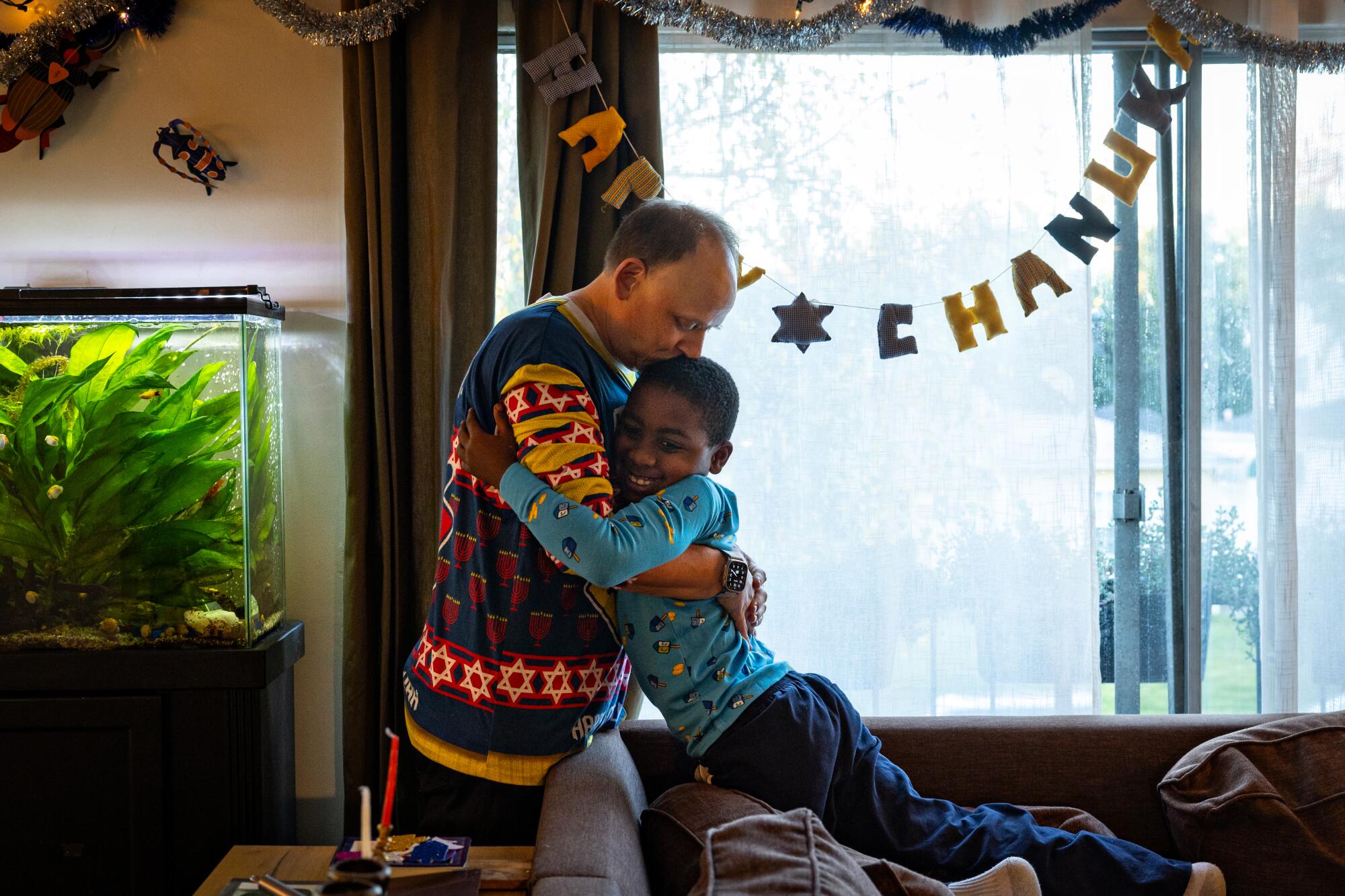
“We have some pretty serious political disagreements,” said Benjamin Kersten, an organizer with the UCLA chapter of Jewish Voice for Peace, a progressive Jewish anti-Zionist group that has staged nationwide rallies calling for a cease-fire. “There’s a way to have these conversations that does return to values of empathy and compassion and justice and equality.”
Still, Kersten expects to celebrate Hanukkah.
“I plan to light my own menorah every night,” he said. “It’s a way to say, ‘Hey, I’m Jewish, and I’m here.’ I personally feel like I’m sort of fighting for what it means to be Jewish and to be understood and standing up for justice and equality.”
Kulbersh, who was reluctant to display the menorah in his Studio City home, said that after his son was upset that he didn’t want to put up Hanukkah decorations, he shared his story with a non-Jewish friend who offered to place a menorah in her own window in solidarity.
“I was so moved by that,” said Kulbersh, who has since started an online campaign, Project Menorah, to encourage non-Jewish people to do the same.
“Now I’m able to turn to my son and say, ‘This year we’re not only hanging our decorations, we’re going big,’” Kulbersh said. “And he’s thrilled.”
More to Read
Sign up for Essential California
The most important California stories and recommendations in your inbox every morning.
You may occasionally receive promotional content from the Los Angeles Times.
